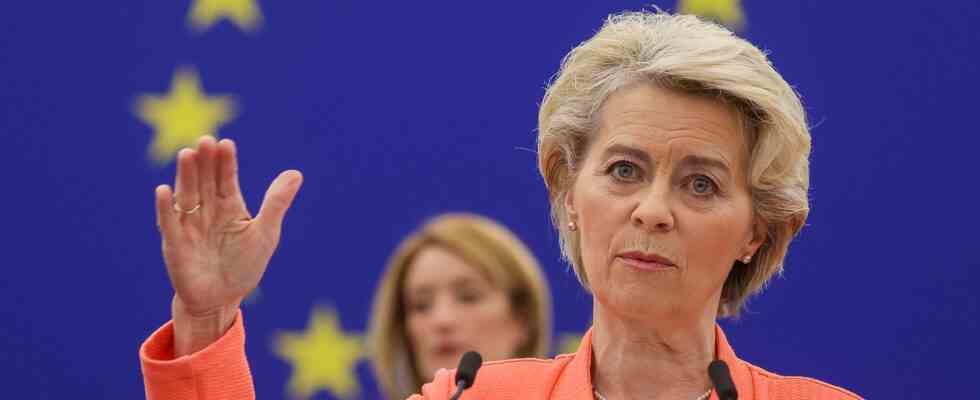Status: 05.10.2022 12:22 p.m
A few days before the next EU summit, EU Commission President von der Leyen supports the option of a general gas price cap. Most recently, more than half of all EU countries had pushed for such a measure.
In the fight against rising energy costs, EU Commission President Ursula von der Leyen has shown herself to be open to the option of a fundamental gas price cap. From their point of view, however, this measure must be subject to certain conditions.
“Such an upper limit for gas prices must be designed in such a way that security of supply is guaranteed,” emphasized von der Leyen in a speech to the European Parliament in Strasbourg. According to the head of the EU Commission, a price cap should initially only apply to gas that is purchased for electricity generation. In addition, the period for such a price cap must be limited – until “we have developed a new EU price index that ensures better functioning of the market”.
A week ago, 15 – and thus more than half – of the EU member states spoke out in a letter to EU Energy Commissioner Kadri Simson for the introduction of such a general gas price cap. This should limit the prices for gas imports from non-EU countries, but also for trade transactions within the EU. Countries that support a price cap include Belgium, Bulgaria, Croatia, France, Greece, Italy, Latvia, Lithuania, Malta, Poland, Portugal, Romania, Slovakia and Slovenia.
Germany against gas price cap
Germany, on the other hand, has so far rejected such an option. The concern: If prices were capped, gas could go to other countries and no longer to the EU. The EU Commission had previously argued similarly and warned against excessive intervention in the free market. The European Commission fears that cross-border trade in gas between EU countries could also become more complicated: If every country pays the same price, the distribution of gas would even have to be regulated politically if necessary. In her speech in Strasbourg, von der Leyen again spoke of a “fine line” to ensure security of supply with the help of a gas price cap.
On the other hand, Federal Economics Minister Robert Habeck heavily criticized the “moon prices” that some exporting countries, including “friendly” countries, would charge for gas. Habeck, however, sees a solution in more specifically bundling the purchasing power of all EU states in order to better exploit the weight of the EU on the world market.
EU gas storage 90 percent full
Von der Leyen also warned of “crazy peaks” that gas prices were threatening to reach. She pushed for more intensive talks with supplying states, such as Norway, in order to agree on a price corridor if possible. Furthermore, the head of the Commission appealed to the individual EU states to strengthen joint gas purchases in order not to outbid each other on the market.
At the moment, the EU is in a good position in terms of security of supply, said von der Leyen. The gas storage facilities within the EU are about 90 percent full, which is 15 percent more than at this point last year – despite reduced imports from Russia. Russian gas supplies fell from 41 percent to 7.5 percent of total EU imports. Overall, the EU members could have reduced their gas consumption by ten percent.
Von der Leyen wants to send her Commission’s proposals on how to deal with the energy crisis again by letter to the EU heads of state and government before they meet for the next EU summit on Friday.

